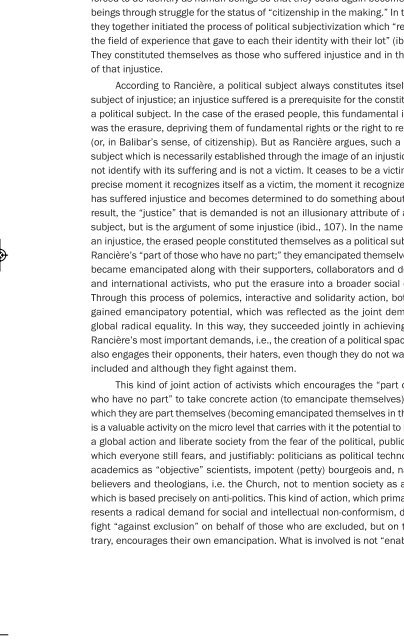The Scars of the Erasure_web
The Scars of the Erasure_web
The Scars of the Erasure_web
- No tags were found...
You also want an ePaper? Increase the reach of your titles
YUMPU automatically turns print PDFs into web optimized ePapers that Google loves.
<strong>Erasure</strong>_4a 10.1.11 20:29 Page 274274 THE SCARS OF THE ERASURElogic <strong>of</strong> “<strong>the</strong>ir” state, <strong>the</strong> state <strong>of</strong> Slovenia. <strong>The</strong> slogan “You have <strong>the</strong> power, wehave <strong>the</strong> erased people” which has accompanied this struggle for years, demonstrates<strong>the</strong> capacity <strong>of</strong> a certain group <strong>of</strong> people to de-identify as Slovenes andidentify with <strong>the</strong> erased people. In much <strong>the</strong> same way, <strong>the</strong> erased people wereforced to de-identify as human beings so that <strong>the</strong>y could again become humanbeings through struggle for <strong>the</strong> status <strong>of</strong> “citizenship in <strong>the</strong> making.” In this way,<strong>the</strong>y toge<strong>the</strong>r initiated <strong>the</strong> process <strong>of</strong> political subjectivization which “redefines<strong>the</strong> field <strong>of</strong> experience that gave to each <strong>the</strong>ir identity with <strong>the</strong>ir lot” (ibid., 40).<strong>The</strong>y constituted <strong>the</strong>mselves as those who suffered injustice and in <strong>the</strong> name<strong>of</strong> that injustice.According to Rancière, a political subject always constitutes itself as <strong>the</strong>subject <strong>of</strong> injustice; an injustice suffered is a prerequisite for <strong>the</strong> constitution <strong>of</strong>a political subject. In <strong>the</strong> case <strong>of</strong> <strong>the</strong> erased people, this fundamental injusticewas <strong>the</strong> erasure, depriving <strong>the</strong>m <strong>of</strong> fundamental rights or <strong>the</strong> right to residence(or, in Balibar’s sense, <strong>of</strong> citizenship). But as Rancière argues, such a politicalsubject which is necessarily established through <strong>the</strong> image <strong>of</strong> an injustice, doesnot identify with its suffering and is not a victim. It ceases to be a victim at <strong>the</strong>precise moment it recognizes itself as a victim, <strong>the</strong> moment it recognizes that ithas suffered injustice and becomes determined to do something about it. As aresult, <strong>the</strong> “justice” that is demanded is not an illusionary attribute <strong>of</strong> an idealsubject, but is <strong>the</strong> argument <strong>of</strong> some injustice (ibid., 107). In <strong>the</strong> name <strong>of</strong> suchan injustice, <strong>the</strong> erased people constituted <strong>the</strong>mselves as a political subject, asRancière’s “part <strong>of</strong> those who have no part;” <strong>the</strong>y emancipated <strong>the</strong>mselves. <strong>The</strong>ybecame emancipated along with <strong>the</strong>ir supporters, collaborators and domesticand international activists, who put <strong>the</strong> erasure into a broader social context.Through this process <strong>of</strong> polemics, interactive and solidarity action, both sidesgained emancipatory potential, which was reflected as <strong>the</strong> joint demand forglobal radical equality. In this way, <strong>the</strong>y succeeded jointly in achieving one <strong>of</strong>Rancière’s most important demands, i.e., <strong>the</strong> creation <strong>of</strong> a political space whichalso engages <strong>the</strong>ir opponents, <strong>the</strong>ir haters, even though <strong>the</strong>y do not want to beincluded and although <strong>the</strong>y fight against <strong>the</strong>m.This kind <strong>of</strong> joint action <strong>of</strong> activists which encourages <strong>the</strong> “part <strong>of</strong> thosewho have no part” to take concrete action (to emancipate <strong>the</strong>mselves), and <strong>of</strong>which <strong>the</strong>y are part <strong>the</strong>mselves (becoming emancipated <strong>the</strong>mselves in this way),is a valuable activity on <strong>the</strong> micro level that carries with it <strong>the</strong> potential to becomea global action and liberate society from <strong>the</strong> fear <strong>of</strong> <strong>the</strong> political, public action,which everyone still fears, and justifiably: politicians as political technologists,academics as “objective” scientists, impotent (petty) bourgeois and, naturally,believers and <strong>the</strong>ologians, i.e. <strong>the</strong> Church, not to mention society as a whole,which is based precisely on anti-politics. This kind <strong>of</strong> action, which primarily representsa radical demand for social and intellectual non-conformism, does notfight “against exclusion” on behalf <strong>of</strong> those who are excluded, but on <strong>the</strong> contrary,encourages <strong>the</strong>ir own emancipation. What is involved is not “enabling ac-


